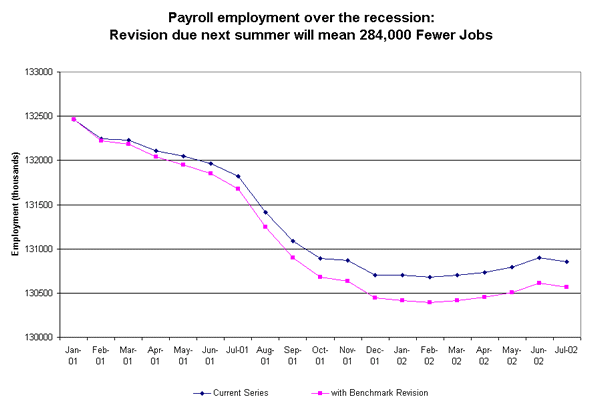A weekly presentation of downloadable charts and short analyses designed to graphically illustrate important economic issues. Updated every Wednesday.
Snapshot for October 23, 2002.
Job loss over the recession has been more severe than was previously thought
A new, more accurate count by the Bureau of Labor Statistics (BLS) highlights, even more starkly than before, the jobless nature of our labor market’s slow-growth recovery. Specifically, the nation’s payrolls fell by 284,000 more jobs, over the recessionary period as a whole, than are shown in the BLS’s month-to-month data.
The revised total count shows that, although the recession may have ended, our economy is still growing too slowly to generate new employment growth. The current economic recovery has been even more “jobless” than we thought.

Although the Bureau will wait until next summer to incorporate its revision of the total count into its official payroll series data, the revised total-the “benchmark revision total,” as it is called-has been released now: 284,000 fewer jobs were created between April 2001 and March 2002. Using the Bureau’s methods for calculating how many jobs were lost in each month, we incorporate the revised total count into the month-to-month payroll series, generating the lower line in the figure. The higher line, representing the current, published series, shows that payroll employment fell by 1.6 million since the start of the recession in March 2001. But the revised series, to be released officially next summer, will show a loss of about 1.9 million jobs between March 2001 and September 2002 (September is the most recent month for which data are available). This loss represents 1.4% of the jobs that existed in the country before the recession began-and so far this year, the weak recovery has yet to create any net new jobs.
Data note: The BLS announced in October that its benchmark revision, to be released in the summer of 2003, will show 284,000 fewer jobs between April 2001 and March 2002. The new, more accurate BLS count reflects reliable administrative data from the Unemployment Insurance program. The Bureau postpones incorporating its revised total for the whole period into its month-to-month series data until it has identified the distribution by industry of the new job counts. By summer of 2003, these losses will be “wedged into” the Bureau’s monthly figures at a rate of 1/12 per month.
This week’s Snapshot by EPI economist Jared Bernstein.
Check out the archive for past Economic Snapshots.
